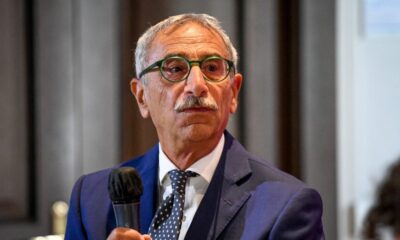Travel
Iceland’s incoming government says it will put EU membership to referendum by 2027
Iceland has traditionally been ambivalent about joining the bloc but issues like the 2008 financial crisis, Brexit and a range of domestic issues has meant the country is slowly warming to the idea of membership.
Iceland’s new government has said it aims to put the question of EU membership to a referendum by 2027.
The incoming administration of Prime Minister Kristrún Frostadóttir, which takes over on Sunday, also said it will set up a panel of experts to look into the advantages and disadvantages of retaining the Icelandic crown over adopting the Euro.
“We agreed that a motion in parliament be agreed upon, stating that we will have a referendum on the continuation of Iceland’s European Union accession talks and that this referendum be held no later than 2027,” said incoming Foreign Minister, Þorgerður Katrín Gunnarsdóttir.
Gunnarsdóttir also heads the pro-EU Liberal Reform party and is widely expected to spearhead any accession talks.
According to a poll conducted by market research company Maskína in June, support for EU membership among Iceland’s population is growing.
That poll found just over 54% of respondents were in favour of joining the bloc, with the majority saying they thought households would be financially better off as part of the EU.
That’s a significant swing in favour of membership in a country that has generally been ambivalent about joining the EU.
In his ‘Public Opinion on the EU in Iceland since 1980’ paper published by Denmark’s Aarhus University, Ragnar Auðun Árnason said that for much of the 1980s and 1990s, Iceland was broadly split into three equal camps regarding EU membership; for, against and undecided.
But issues like the 2008 financial crisis, Brexit and a range of domestic issues has meant that Icelanders seem to be slowly warming to the idea of joining the bloc.
And a significant majority of those polled by Maskína – 74.2% – said it was important that the issue be decided by referendum.
New government unveiled
The new government was presented to the public by president Halla Tómasdóttir at a ceremony in the southwestern town of Hafnarfjörður.
Prime Minister Kristrún Frostadóttir, who is the leader of the centre-left Social Democratic Alliance, said she aims to cut inflation and interest rates.
“This new government will face challenges united. Our first task is to stabilize the economy and lower interest rates with strong leadership in fiscal policy. In the meantime, this government will break the deadlock, and work towards greater creation of wealth in the private sector. The quality of life in the country will be increased through unity surrounding these challenges,” she said.
The Social Democratic Alliance became the biggest party in November’s snap elections, called after the previous coalition government led by Bjarni Benediktsson collapsed due to infighting.
It agreed to form a government with the Liberal Reform Party and the centrist People’s Party. It’s the first time in Iceland’s history that the leaders of all the governing parties will be women.
National broadcaster RUV reported that at 36, Frostadóttir will be Iceland’s youngest ever PM.
RUV also said that the incoming administration aims to reduce the number of government ministries in order to cut some administrative costs.
Travel
Europeans prioritise work-life balance whilst Asia focuses on career – study
A recent study highlights different attitudes towards work for EU countries and the Global South. The study chairperson is urging European leaders to start tackling serious issues sooner rather than later.
The Global South, a term which loosely refers to developing economies, is more satisfied with work life balance than countries in the EU, according to a recent study.
The study, carried out by Amrop, a leading global leadership and executive search consultancy, conducted The Meaning of Work study with 8,000 participants across Germany, France, Poland, the UK, the USA, China, India and Brazil.
The study saw German, French and Polish participants report satisfaction below 50%, whilst India reported a 73.3% satisfaction and the USA 59.9%, despite lower social and labour regulatory standards.
Global Chair of Amrop, Annika Farin, told Euronews that what surprised her the most from the study is Europe’s “non-willingness to step up and have the wish to go into a responsible role, be it in business or be it in politics.” She said she sees it as a wake-up call for European leaders.
“We should take that seriously and do something about it jointly,” Farin adds.
With the development of AI and shifting demographics, such as the Baby Boomer generation retiring and Gen Z entering the work force, societies are going to have to embrace changes all around.
“I think we cannot underestimate what’s coming. If we look at the demographics, we see what’s coming. We’ll have to have more people that we bring into our countries,” Farin says, urging more innovation regarding migration.
“What I liked in the study and was surprised to see, in a positive sense, was that it seems that a country like Germany remains attractive for other geographies and nearby countries,” she says.
According to the study, the USA (33%) is the top global choice when it comes to attractive working conditions, thanks to its strong job market, high salaries and diverse industries. Germany follows with 22%, ahead of Canada and the UK, each with 21% of global worker preferences.
“We should see that as an opportunity. Because that can also go away,” Farin says.
The study also shows that countries and age groups are united in their motivation to work for a good salary and in interesting jobs. Pensions are regarded as a hot topic amongst European countries, and have sparked major protests across France and fuelled political debate in Germany.
“One of the topics we really have to talk about, and I know that’s not always popular, is that people might have to work longer in some countries, in certain countries at least, particularly in European markets.” Farin suggests creating initiatives, such as lower taxation for pensioners that work for longer, and using entrepreneurial role models in the media and society to bridge the gap between older and younger people.
The study also shows that countries in the Global South show a stronger interest in leadership roles.
76% of Indian respondents and 66% of Brazilians aim for leadership or entrepreneurial roles. Comparatively, only 36% in Germany and 37% in France share this ambition.
Travel
Little reason for cheer as drought forces Spain to ration Cava wine production
Sales of cava, the Spanish sparkling wine, are down globally thanks to bad weather affecting vineyards but industry leaders have a plan to reverse their flagging fortunes.
Christmas may be round the corner, but cava makers have little to toast after a severe drought over the past three years wrought havoc on harvests.
Supplies of the bubbly wine which is made almost exclusively in Spain’s Catalonia region have run short, forcing bodegas to ration sales to their biggest markets abroad.
About 70% of the cava produced is sold abroad while the rest remains in the Spanish market.
Global sales of cava have fallen between January and September this year by 12.8% compared to the same period last year, according to an industry body. International sales dropped nearly 16%.
Traditionally, Germany was the largest market for lovers of Spanish bubbles but the self-imposed rationing of supplies by cava producers led to a drop of 55% in sales this year.
Part of the reason for this nose-dive in sales to Germany was Freixenet, the biggest cava producer in the world, which greatly reduced its supplies because it simply did not have the stock to sell.
In Britain, where cava has been a popular drink for many years, sales dropped 15.44% this year, compared with in 2023. Italian Prosecco has become the fizzy drink of choice for many.
This meant that Belgium became the leader in international sales, followed by the United States, where Spanish bodegas sold 12 million bottles this year. Russia, where the bubbly is popular, fell in the rankings of foreign markets, with a decrease of 20% in sales.
Amid this uncertainty in the cava world, the only countries where demand increased were Sweden, Japan and the Netherlands.
“It is clear that there is a scarcity of product available on the market at a moment when a quality fizzy wine like cava is well considered throughout the world,” Javier Pagés, the president of the Denomination of Origin of Cava Producers, which represents most bodegas, told journalists at a meeting earlier this month.
However, for producers of cava – but perhaps not for drinkers – the scarcity of the drink has delivered some pluses.
Prices rose on average by 20% internationally and 10% in Spain, according to the cava producer’s organisation.
“Fortunately, the scarcity of the product does have positive sides. As demand is higher than the available product, prices and margins trended upward, allowing value to be added throughout the chain (of production),” Pagés added.
“At the same time, the prices paid for grapes in the final harvest were once again significantly higher but on the other, the vast majority of winegrowers once again had very low yields due to the drought.”
Prayers for rain to avoid another drought
Cava growers are cautiously optimistic that 2025 may be wetter than the three previous years, when the drought was so severe than many villages in Catalonia resorted to praying for a few drops to fall.
The major companies called for Spanish authorities to help provide irrigation schemes and other projects to help counter future droughts.
Catalonia’s regional government recently announced plans to spend €2.3 billion by 2040 to try to solve its chronic water shortage problems.
Among the plans, is a new seawater desalinisation plant on the Costa Brava, at a cost of €200 million but it will also require financial help from the Spanish government.
Cava makers may have been hampered by a long-running drought, but they have also had to face increasing competition from their fiercest rivals, Champagne and Prosecco.
Sparkling wines have boomed in popularity in recent years, according to the International Organisation of Vine and Wine (OIV), an industry group, while wine’s popularity is generally on the decline as drinkers have turned to beer and spirits.
Red wine sales have declined while white wine, driven by the popularity of Prosecco, have increased.
“White wine demand and supply at the global level have expanded since 2000. At the beginning of the century, white wine accounted on average for 46% of the world total, while in more recent years this share rose to 49%,” an OIV report for 2023 said.
“One of the main driving forces behind this increase is the boom of sparkling wine. The main countries which contributed to the growth at the world level are Italy (driven by the global success of Prosecco), the USA, South Africa and Australia.”
In the cut-throat world of wine, some cava producers are dismissive of their Italian rival, Prosecco.
“Prosecco is just water and bubbles. Cava is a drink which takes years to produce, like champagne. It takes years to produce it. Prosecco is produced in months,” one cava maker who did not want to be named, told Euronews Culture.
The cava industry provides work for 6,200 people and it is produced by 349 bodegas, which sell cava in 100 countries.
Cava is not just a preserve of Catalonia; there are bodegas in other parts of Spain. But the drink is closely associated with the north-eastern region.
When Catalan separatists staged a failed independence bid in 2017, producers suffered from a hugely damaging boycott from other parts of the country.
Travel
Church bells ring across Magdeburg as city mourns victims of Christmas market attack
A nine-year-old child and four adults were killed and around 200 others injured, 41 of them so badly that authorities fear the death toll could rise.
The bells of Magdeburg Cathedral have been rung to remember the victims of what is being treated as a deliberate attack on the city’s Christmas market that killed five people and injured around 200 others.
Magdeburg marked the tragedy on Saturday evening with church bells across the city tolling in unison at 7:04pm, the exact time of the attack on Friday in the city of roughly 240,000 people.
The alleged attack saw a man, named only as Taleb A. in the media, drive a car into the busy Christmas market.
A nine-year-old child and four adults were killed and around 41 people have been so badly hurt that authorities fear the death toll could rise.
“There is of course the incomprehensibility of the event, the grief with the relatives, with the injured, the incomprehension of how people can do this to other people. Sometimes you almost feel like you’re watching a movie. But the fact is, it is reality,” said Regina Stieler Hinz, Magdeburg’s Deputy Mayor.
Chancellor Olaf Scholz attended the Saturday evening service at the cathedral alongside his Vice-Chancellor Robert Habeck and President Frank-Walter Steinmeier.
The driver of the vehicle, a 50-year-old doctor who immigrated from Saudi Arabia in 2006, surrendered to police at the scene.
He’s being investigated for five counts of suspected murder and 205 counts of suspected attempted murder, prosecutor Horst Walter Nopens said at a news conference.
Among other things, investigators are looking into whether the attack could have been motivated by the suspect’s dissatisfaction with the way Germany treats Saudi refugees, Nopens said.
Although Nopens mentioned the treatment of Saudi immigrants angle, authorities said that they still don’t know why the suspect drove his black BMW into the crowded market.
Describing himself as a former Muslim, the suspect appears to have been an active user of the social media platform X, sharing dozens of tweets and retweets daily focusing on anti-Islam themes, criticising the religion and congratulating Muslims who had left the faith.
He also accused German authorities of failing to do enough to combat what he referred to as the “Islamification of Europe”.
German authorities aware of Taleb A. for years
In 2013, he was convicted by the Rostock District Court of “disturbing the public peace through threats of violence” and fined the equivalent of 90 daily rates.
Furthermore, Saudi Arabia had reportedly issued three warnings to Germany about his extremist views, according to German news agencies. However, Der Spiegel reported that the specifics of these warnings remain unclear.
A year ago, German police planned to issue Taleb A. with a “Gefährderansprache”, a warning intended for individuals considered potential threats.
This measure, designed to alert individuals that they are under surveillance and deter criminal activity, was ultimately not carried out.
The reasons for this remain undisclosed, according to Tom-Oliver Langhans, director of the Magdeburg police, who spoke at a press conference following the attack.
Shock across Germany
The violence, just days before Christmas, has shocked Germany and prompted several communities across to cancel their weekend Christmas markets as a precaution and out of solidarity with Magdeburg’s loss.
“Especially these days, when the longing for love, security and an intact world is particularly strong, such an act is all the more frightening and abysmal. And somewhere we are also speechless and helpless, but volunteers, the emergency pastoral workers were on site and many helped out. And I am incredibly grateful for that,” said Magdeburg’s Catholic Bishop, Gerhard Feige.
Although many people went to the site with candles to mourn the victims, several hundred far-right protesters gathered in a central square in Magdeburg with a banner that read ‘remigration,’ German news agency dpa reported.
Berlin kept its many markets open but increased its police presence.
Germany has suffered a string of extremist attacks in recent years, including a knife attack that killed three people and wounded eight at a festival in the western city of Solingen in August.
Friday’s attack came eight years after an Islamic extremist drove a truck into a Christmas market in Berlin, killing 13 and injuring many others.
The attacker was killed days later in a shootout in Italy.
-

 EU & the World2 days ago
EU & the World2 days ago’30 for 30′ Lyrics Breakdown: SZA & Kendrick Lamar’s Song Meaning
-

 EU & the World6 days ago
EU & the World6 days agoWho Is Nima Momeni? 5 Things About the Convicted Killer of Bob Lee
-

 Sports7 days ago
Sports7 days agoAlessandro Buongiorno knocked out, professor Castellacci is unbalanced on recovery time
-

 EU & the World5 days ago
EU & the World5 days agoIs Skibidi Toilet Coming to Fortnite? Find Out
-

 Sports5 days ago
Sports5 days agoDeparture from Italy for the Vuelta 2025
-
Travel7 days ago
UK changes travel advice for Israel: Where is it safe to visit in the Middle East right now?
-

 Sports5 days ago
Sports5 days agoApprehension during Inter-Udinese: a fan is sick, match suspended for a few minutes
-

 Sports7 days ago
Sports7 days agoDusko Ivanovic calls for character from Virtus Bologna









